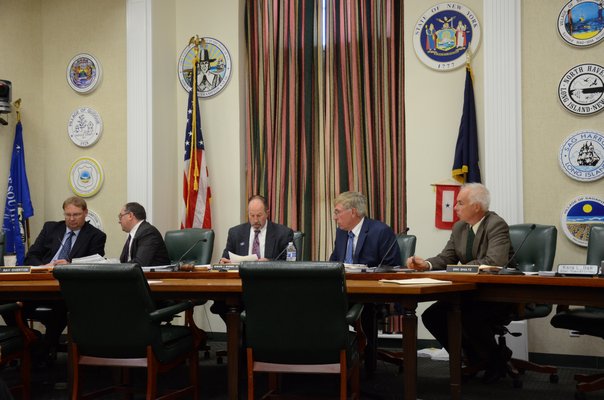
New York State’s highest court has declined to hear an appeal by the Southampton Town Trustees regarding a lower court ruling that stripped them of their authority to regulate erosion control devices, including the installation of hardened structures, along the oceanfront within incorporated villages.
The rejection by the State Court of Appeals, handed down on January 7, has left the Trustees and others uncertain if board members now retain any regulatory authority within those municipalities, and immediately raised concerns of new restrictions on beach access within those incorporated villages.
“They didn’t want to hear our appeal,” said Trustee Scott Horowitz, who was elected to a second two-year term in November, about the State Court of Appeals. “We lost the ability to regulate hard structures.”
The Trustees had been seeking another chance to appeal an earlier ruling in three parallel lawsuits involving the villages of Quogue and West Hampton Dunes, and Albert Marine Inc., a contracting company hired by homeowners to install giant sandbags along the ocean, in front of the Quogue Village Beach, to protect the shoreline following a series of damaging storms in 2011.
The court battle has been a complicated one and dates back to 2012, when the Town Trustees sued both Quogue and Albert Marine following the sandbag installation along the shoreline. The Trustees alleged that their installation, buried under artificial dunes, was done without required Trustee-issued permits and also violated their regulations in terms of shoreline protection efforts. Both Quogue and Albert Marine filed counter-suits, and West Hampton Dunes filed a companion suit, all charging that the Trustees should have no authority within their oceanfront villages.
In 2012, State Supreme Court Justice Peter H. Meyer ruled in the West Hampton Dunes case that the Trustees still held authority within the village to regulate activities within the public access easement along the ocean beaches. The village appealed that ruling and, last spring, an appellate court reversed it, stating that a 19th century state law had stripped the Trustees of any authority on land, leaving them control over only fisheries, bay bottoms and activities occurring in town waters.
That ruling dismissed how the Trustees have traditionally regulated the oceanfront, including those stretches within incorporated villages, policies that forbid the installation of seawalls, bulkheads and other hardened protections that, they say, exacerbate erosion and threaten all of the town’s beaches—and the rights of residents to access them.
The decision by the State Court of Appeals not to hear the Trustees’ appeal has prompted some officials to state that the board no longer has any authority within incorporated villages.
“They have no jurisdiction—they’ve lost it all,” said Gary Vegliante, the longtime mayor of West Hampton Dunes. “It’s one of the most devastating losses they’ve ever had. It’s a shame.”
He went on to say that, in his opinion, the Trustees should no longer be allowed to issue permits for 4x4 vehicles to drive on any village beaches. Mr. Vegliante also hinted that his village is moving toward issuing its own permits.
Richard Cahn of Cahn & Cahn LLP in Huntington, the attorney representing the Town Trustees, confirmed Tuesday that the recent appeal denial muddies the water in terms of what regulatory authority his clients still retain in the villages and elsewhere.
Mr. Cahn noted that the original decision by Justice Meyer acknowledges the public easement held by the Trustees, including those in incorporated villages, and that the public’s right to access it should not be blocked. But the appellate court ruling said the Trustees hold no authority to impose any regulations within the easement area, aside from the specific types of archaic activities, such as the gathering of fish and seaweed. Some other attorneys have questioned whether more modern activities, like 4x4 vehicle access, could be included under those activities.
Mr. Cahn, who said he expected to discuss the issue with the board during an executive session on Wednesday, said the Trustees appear to have limited options at this point. According to the attorney, they can attempt to clarify the extent of their regulatory authority on their own, ask a state lawmaker to step in and introduce legislation that attempts to better explain their powers, or challenge the decisions made by villages in court.
Another option, he added, could be for the Trustees to press the authority issue and then be prepared to defend themselves, assuming that they will be sued.
But Nica B. Strunk, the attorney representing Quogue Village, contends that the denial sends a clear message to the Trustees—their authority in incorporated villages is extremely limited in scope.
“Nothing is muddy, it’s clear,” she said. “The Trustees do not have any jurisdiction over the oceanfront beaches except for gathering of seaweed and fishing. Period. That’s the law. They wish it was muddy or unclear but it wasn’t.”
Mr. Cahn noted that his board’s options will be discussed among the Trustees—as will the potential loss of some $50,000 in annual revenue that they now receive through the issuing of beach access permits—at the meeting.
Both Town Trustees President Edward J. Warner Jr. and Trustee Eric Shultz declined to discuss the appeal denial when reached this week, directing all questions to their attorney, Mr. Cahn.